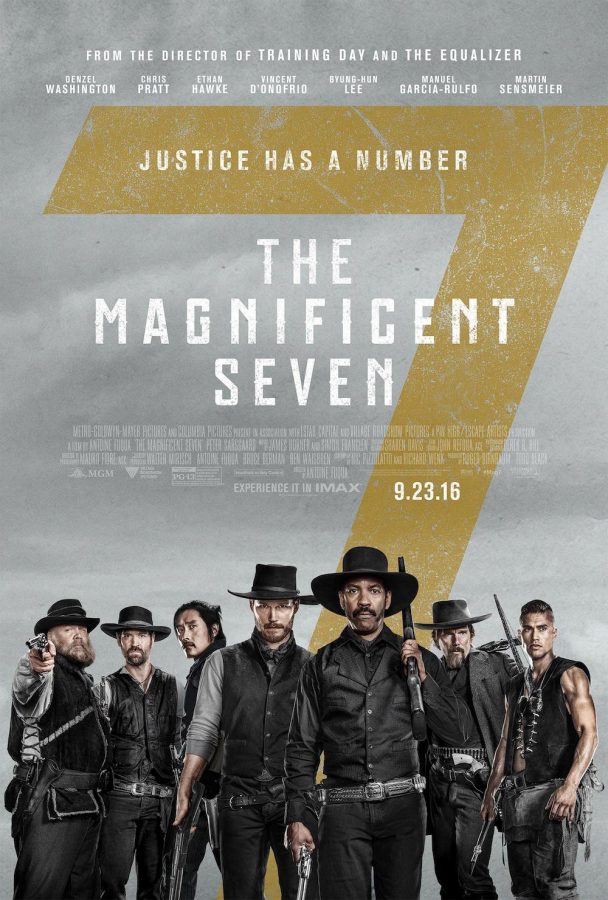Anchors (Out of Four): 
In Antoine Fuqua’s “The Magnificent Seven,” based on the 1960 film of the same name, the evil mining baron Bartholomew Bogue (Peter Sarsgaard) terrorizes a small town on the Western frontier when they refuse to sell their land to him. Emma Cullen (Haley Bennett), in a last ditch effort to save her home, uses all of the town’s remaining money to hire a bounty hunter named Sam Chisolm (Denzel Washington). Most of the film follows Chisolm and Cullen as they put together a team of seven expert gunmen who eventually engage in a final showdown with Bogue and his men.
It seems fitting to start with our seven protagonists, all of whom are archetypal depictions of over the top action heroes. Chris Pratt (“Guardians of the Galaxy,” “Jurassic World”) has made a name for himself as a comical action hero, and he doesn’t let us down here as the gambling outlaw Josh Faraday. Of course, Washington (“American Gangster,” “Flight”) doesn’t either as the straight man to Pratt’s comic relief. He’s a veteran actor and he plays these roles perfectly. But just as good are some of the other members of the seven. Vincent D’Onofrio (“Law and Order: SVU,” “Daredevil”) and Ethan Hawke (“Boyhood,” “Gattaca”) give us the characters of Jack Horne and Goodnight Robicheaux, and by those names alone you can see what I’m getting at. This is an ensemble in the best sense of the word, with each character representing something wholly different from all the others.
I’ve read a couple of reviews already of this movie (I know we’re not supposed to do that, but the temptation was too much), and what stood out to me as a few common threads were the arguments that “The Magnificent Seven” was too simple, a throwaway popcorn movie meant to hold over the masses between the summer and Christmas blockbuster seasons, or that it wasn’t as good as John Sturges’ original film. Much like many of the bullets shot at our protagonists, both of these criticisms miss the mark.
First, “The Magnificent Seven” is certainly a simple film. It doesn’t add anything particularly new to the Western genre, but I don’t think that’s a bad thing by any means. This movie is fun and bright. It lays out very traditional notions of good and evil, right and wrong. It gives us wide angle shots of bright summer deserts in the American west, and some of the supporting characters appear as caricatures of the genre. But they’re not. “The Magnificent Seven” owns these elements. It’s unabashedly proud to be a western in the classic tradition, and based on the genre right now, that’s something new in its own right.
After all, what western movies did 2015 give us? We got Alejandro González Iñárritu’s “The Revenant,” a beautifully shot cinematic masterpiece, but a film whose natural winter lighting, ultra-realism, and revenge story all translated into something incredibly grim, leaving audiences impressed but not necessarily satisfied. Then we got Quentin Tarantino’s “The Hateful Eight,” a quasi-satirical murder mystery that takes place almost entirely in a cabin (and, it bears mentioning, also takes place in the winter). I don’t even want to mention Adam Sandler’s “The Ridiculous Six,” but I do so only to point out that its name (and the name of Tarantino’s movie) both show us how much impact the original “Seven” had on the genre.
Fuqua’s new film recognizes that. He takes the aesthetic and the cultural formula that defined old westerns and updates them for the modern screen, and he does so with a plot and a cast that are both different enough to define the film in its own right.
A note on comparing this to the original. The original “Magnificent Seven” was itself a remake of Akira Kurosawa’s “Seven Samurai,” widely considered one of the best action films of the century. Its contemporary reviews were very negative, saying it couldn’t stand up to its source material. The comparison, of course, proved not to be apt, as “The Magnificent Seven” became a classic in its own right. I don’t expect this one to gain the same following, but I do believe it’s best to interpret it not as competing with the original, but rather embracing the western tradition.
That’s not to say I wasn’t a bit worried, especially with the trailer featuring a banging rap track. However, when Elmer Bernstein’s original score of the film kicks in at the end credits, I knew my worries were unfounded. “The Magnificent Seven” is the American western returning to form.
Verdict: Anchor Down. It’s not perfect, but this film is a lot of fun, and sometimes that’s all you need.











